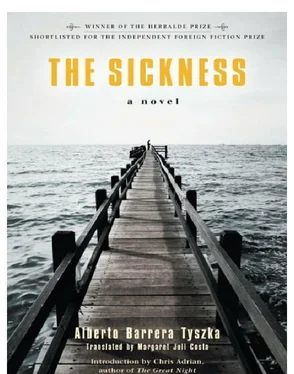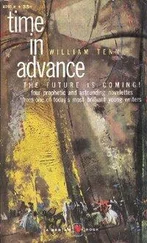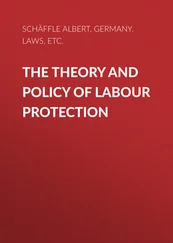When he woke, he had usually wet himself and was trembling. Even when he got out of bed, he still felt himself to be in the grip of the dream. It would take him almost a minute to get out of that plane and escape from the bottom of the sea, and stop hearing his mother’s cries. His father proved a tireless warrior on his behalf. He patiently helped Andrés to defend himself against those enemies. He was always there, on the edge of the dream, waiting for him.
These memories crowded into his mind as he watched his father in the examining room. Did he perhaps have the same presentiment? Andrés would doubtless prefer him not to. When you’re nearly seventy, he thought, a bad omen is like a gunshot. At that age, there are no more deadlines, there is only the present.
The nurse removed the needle and handed Javier Miranda a piece of cotton wool soaked in hydrogen peroxide. He pressed down hard on the place where the needle had gone in and glanced at his son as if pleading for a truce, as if asking if they couldn’t just get up and leave. Are the monsters of old age as terrible as those that assail us when we’re children? What do you dream about when you’re sixty-nine? What nightmares recur most often? Perhaps this is what his father dreams about: he’s in an examining room, in the bowels of a hospital, surrounded by chemicals, sharp implements, gauze, and strangers all repellently dressed in white; yes, he’s in the bowels of a hospital, looking for a tiny bubble of air, so that he can breathe, so that he can shout: “Andrés! Andrés! Get me out of here! Save me!”
While Andrés was driving his father home, he tried to avoid talking about the subject. It wasn’t easy. His father kept muttering bitterly to himself. He claimed that the tests were a complete waste of time, that the only thing they would show was that his cholesterol levels were slightly raised, if that. Certainly nothing more, he insisted. Andrés dropped him off at the door to his apartment building. As he was driving away, he could still see his father in the rearview mirror. There had been a time when he had considered having his father move in with them, but had feared that family life might become a nightmare for everyone. Mariana got on reasonably well with his father, and his children had a lot of fun with him, but those were only sporadic encounters, occasional trips to the movies or to a park, to a restaurant or to a baseball game. Day-to-day life is a different matter, a far more demanding exercise. And yet, at that moment, while he could still see him, a diminutive figure in the rearview mirror, he again considered the possibility. Sooner or later, if you were an only child, you had to pay for your exclusivity. His father had no one else. If, instead of standing in the corridor, talking to the neighbor, he had been alone in his apartment, it could have been really serious. For a second, Andrés sees the scene with hideous clarity: his father goes into the kitchen to turn off the gas under the coffeepot, he bends over, loses consciousness, and collapses. In the same movement, in the inertia of the fall, his head drops forward, propelled by the weight of his body. It strikes the edge of the stove, then the handle on the oven and, finally, the tiled floor. The green veins in his forehead are swollen and tense. His nose is broken. His right eye looks slightly sunken and there is blood on his right cheekbone. There’s more blood above his right eyebrow. He could have broken a rib: perhaps, when he comes to, he won’t be able to move or call anyone. The water is boiling. Soon there will be the smell of burnt coffee.
That night, Andrés would have liked to make love with Mariana. Not for any special reason and without even feeling any particular desire for her, but he needed to have sex. It was a need, a furious longing to be on top of her, penetrating her, without thinking about anything, without saying anything, just following the urgent pistoning of hips, the rise and fall. But he didn’t know how to approach her. He wasn’t in the mood to seduce her and felt ashamed to say what he really wanted. Women don’t understand that for men sex is sometimes a sport, one they can practice at any time, at any moment, and with anyone. Masculinity is too basic, too simple. The love ethic tends to be feminine.
“Don’t you think you’re blowing things up out of all proportion?” Mariana asked before they went to sleep. “You don’t even know the results of the tests yet. Why are you getting so upset?”
Andrés reminds her that his father has become rather forgetful lately. Every detail now begins to take on a new importance for him, a new value.
“Even you commented on it recently,” he says. “We were here, having a meal.”
“Yes, true. But that’s normal, isn’t it? Even I forget things sometimes, so why shouldn’t your father? Don’t exaggerate. Why insist on thinking the worst?”
He doesn’t know why, he certainly didn’t know then. But he had that incomprehensible, unpleasant feeling, as if some fatal, imminent event were circling him, the intuition that what had happened to his father that day was the first sign of something much more serious and definitive: Burkitt’s lymphoma, for example, or a cutaneous mucinous carcinoma, or an asymptomatic plasma cell neoplasm. Andrés knows perfectly well that nature translates those words in the most pitiless way. What terrifies him most is imagining his father suffering. His father hunched and screaming, racked with pain and weeping. Pain is the most terrible of the body’s languages. A grammar of screams. A prolonged howl.
He left Mariana reading in bed and went out onto the balcony. It annoyed him that he should start believing in presentiments. A doctor with a PhD in immunology and almost twenty years’ professional experience has no right to have presentiments. Susan Sontag said that there are two kingdoms: sickness and health. Human beings often have to move between the two. Andrés has often thought that in the middle, on the frontier of those two geographies, stand the doctors, checking passports, asking questions, weighing things up. They may have their suspicions, but they need proof. It’s a job that requires evidence. A doctor sees erythema, hematoma, cells, enzymes, proteic variables; a doctor reads symptoms and takes no notice of vibes, hunches, fleeting images.
The sound of the telephone ringing was like an aluminum finger scraping the air. He answered at once. It was the laboratory. The test results he had asked for as a matter of urgency were ready. While he listened to the figures, noting them down on a piece of paper, he continued to feel the same anxiety. It was as if a voracious, insatiable animal had taken up residence inside him and was still there, panting, even when he could see that all the results were normal. Just as his father had said, the only thing wrong was a slightly raised cholesterol level. Everything else was fine, within the usual range. He glanced at his watch and decided that it wasn’t too late to call his father. Not that he was in celebratory mood. The wretched presentiment refused to go away, it wasn’t satisfied. There is always some piece of gossip over which the blood has no control. He picked up the phone and rang the hospital again. He booked an appointment first thing the next morning to take some chest X-rays and do a CT scan. He didn’t want to leave any room for doubt.
Why does he insist on thinking the worst?
Because sometimes the worst happens.
It wasn’t easy to persuade his father to go back to the hospital. Andrés almost had to drag him there. He immediately got upset and went on the defensive. Andrés showed him the blood-test results and assured him that everything was fine, but his father reacted as anyone else would have:
“If everything’s fine, why are you making me go for more tests?”
Читать дальше












